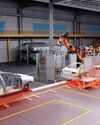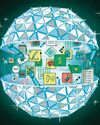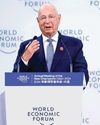
BY EARLY NOVEMBER, IT WAS VIRTUALLY certain that 2024 would be the hottest year on record. The evidence was being felt around the world—from flooding that killed hundreds in Spain to drought in 48 of America’s 50 states. Insurance giants dropped coverage in danger zones and warned about the growing challenge posed by climate change. Amid all that, a casual observer might have expected negotiators gathered at U.N. climate talks in Baku, Azerbaijan, to double down on the most critical efforts to cut global emissions and prevent the problem from getting worse.
Instead, the talks, known this year as COP29, devolved into a chaotic conflict across decades-old battle lines. The deal that emerged—an agreement for developed countries to lead in providing $300 billion annually in climate finance to Global South nations—was enough to keep hope alive but far from sufficient to tackle the scale of the problem. Chandni Raina, a negotiator for at-risk India, summed up the prevailing sentiment after the finance agreement was gaveled in: “We are extremely hurt.”
The talks were a fitting end to a complicated year of climate action. As the problem grows worse, leaders constrained by political considerations keep eking out piecemeal solutions. The solutions could be worse, but they could also be a lot better. In 2024, few politicians are denying the urgent science of climate change. Yet most are struggling to act on the scale necessary to help the world avoid the worst effects of warming.
But that doesn’t mean all is lost. This year brought some glimmers of progress. The economics of clean energy have improved. Policies enacted years ago are paying dividends. And innovators—technological, financial, and policy—continue to forge ahead. In time, those developments will make a more sustainable future inevitable. The question is what the path looks like to get there.
Esta historia es de la edición December 30, 2024 de Time.
Comience su prueba gratuita de Magzter GOLD de 7 días para acceder a miles de historias premium seleccionadas y a más de 9,000 revistas y periódicos.
Ya eres suscriptor ? Conectar
Esta historia es de la edición December 30, 2024 de Time.
Comience su prueba gratuita de Magzter GOLD de 7 días para acceder a miles de historias premium seleccionadas y a más de 9,000 revistas y periódicos.
Ya eres suscriptor? Conectar

Q & A: Borge Brende
The World Economic Forum president talks with TIME editor Sam Jacobs

Q & A - Rene Haas
Arm's CEO on how his hardware is supporting the Fourth Industrial Revolution

The conflicts looming over 2025
WHEN DONALD TRUMP TOOK THE OATH OF OFFICE AS President in January 2017, his first foreign policy priority was to get tough on China. The Trump 2.0 Administration will continue that work. But when he strides back into the Oval Office in January 2025, Trump will also become responsible for U.S. management of two dangerous wars, the kinds of hot foreign policy crises he was fortunate to avoid during his first term.

Rev Lebaredian
Nvidia's vice president of Omniverse and simulation technology on training AI-powered robots

5 predictions for AI in 2025
New uses and policy questions come into focus

Roy Wood Jr. The comedian on his new stand-up special, the importance of working in food service, and learning from Keanu Reeves
8 QUESTIONS WITH Roy Wood Jr.

A call for global cooperation in the Intelligent Age
Cultivate wisdom along with innovation

The D.C. Brief
IN THE END, THE THREAT OF A FARright revolt proved more menacing than most imagined, as Republican Mike Johnson initially came up short on Jan. 3 during the first balloting to keep him as Speaker.

The digital labor revolution
OVER THE PAST TWO YEARS, WE'VE WITNESSED advances in AI that have captured our imaginations with unprecedented capabilities in language and ingenuity. And yet, as impressive as these developments have been, they're only the opening act. We are now entering a new era of autonomous AI agents that take action on their own and augment the work of humans. This isn't just an evolution of technology. It's a revolution that will fundamentally redefine how humans work, live, and connect with one another from this point forward.

Tech we can trust
Serving humanity's best interests must be at the center of progress